Theories of Counselling: Conformity, Social Impact in Psychology
VerifiedAdded on 2023/01/03
|5
|1118
|29
Essay
AI Summary
This essay delves into two prominent theories within the field of counselling: the Conformity Personality Theory and the Social Impact Theory. The essay begins by defining counselling as a process of consultation aimed at helping individuals navigate psychological, emotional, and relational challenges. It then explores the Conformity Personality Theory, which examines how individuals adjust their behaviors to align with group norms, highlighting traits that make people more likely to conform. Following this, the essay transitions to the Social Impact Theory, developed by Bibb Latane, which investigates how social factors influence individuals' thoughts, feelings, and behaviors. The essay discusses key factors of this theory, including immediacy, strength, and the number of influencing sources. It concludes by emphasizing the broader implications of these theories, particularly in understanding social influence, conformity, obedience, and their impact on professional fields such as marketing. References to relevant literature are included to support the discussion.
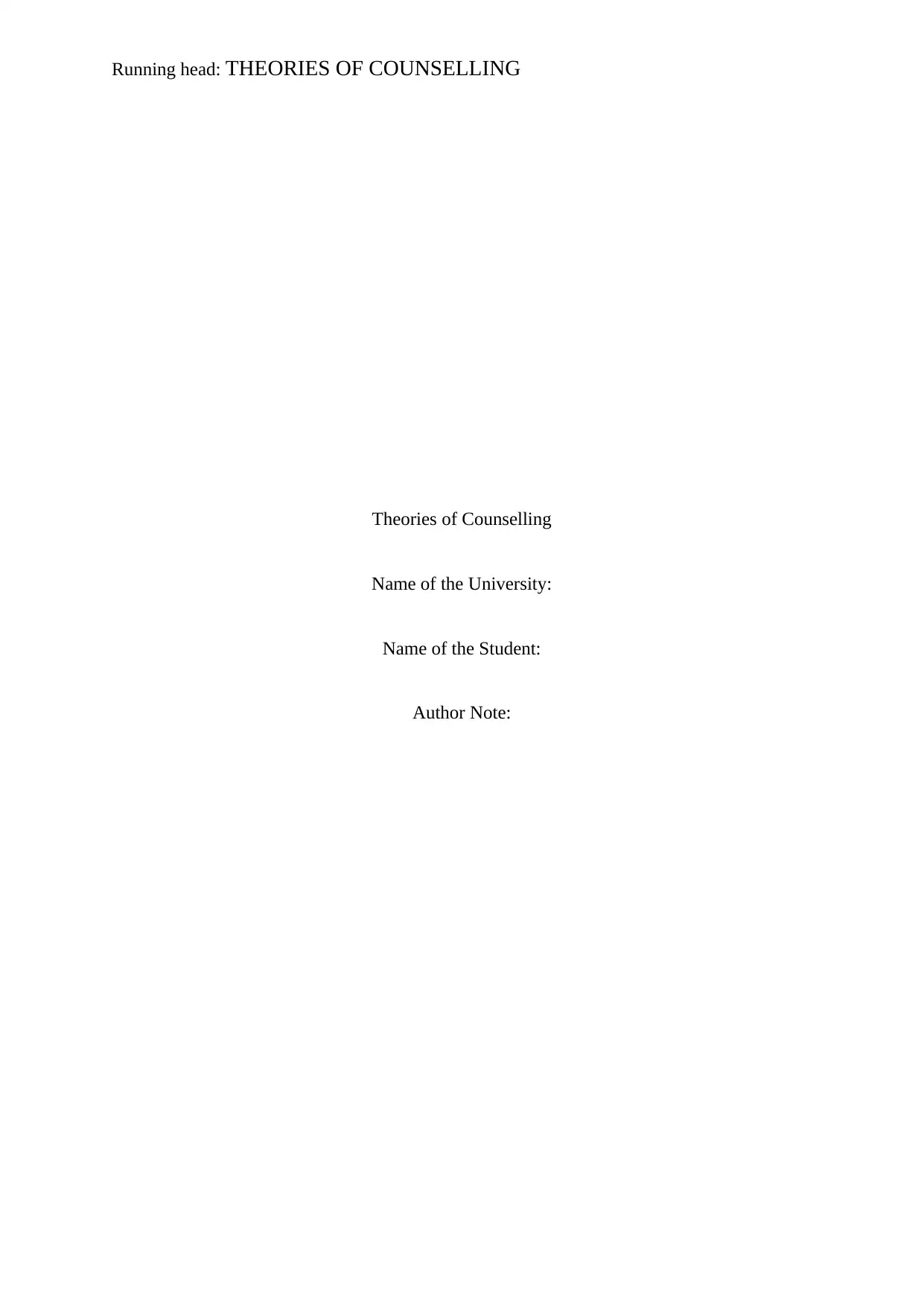
Running head: THEORIES OF COUNSELLING
Theories of Counselling
Name of the University:
Name of the Student:
Author Note:
Theories of Counselling
Name of the University:
Name of the Student:
Author Note:
Paraphrase This Document
Need a fresh take? Get an instant paraphrase of this document with our AI Paraphraser
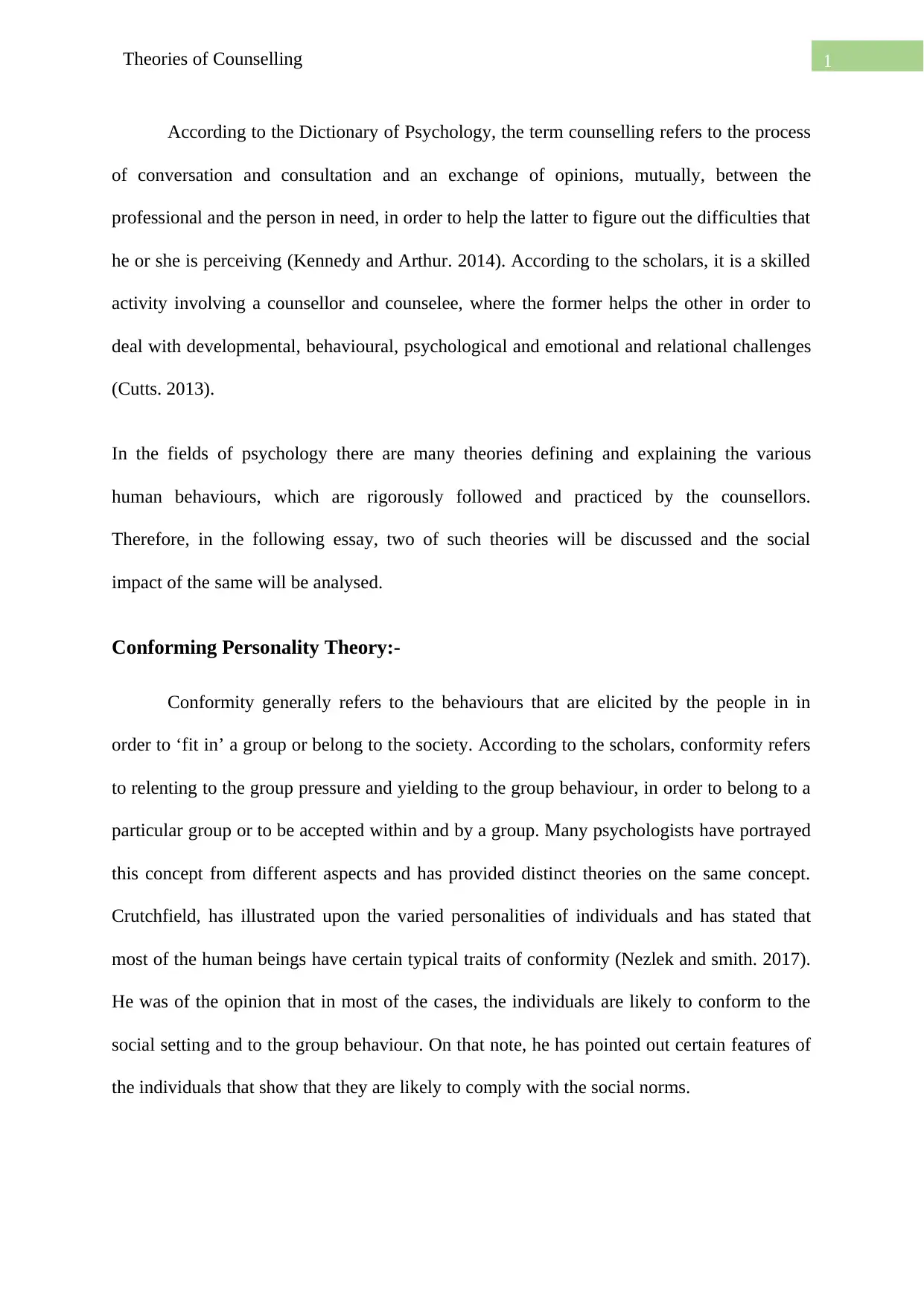
1Theories of Counselling
According to the Dictionary of Psychology, the term counselling refers to the process
of conversation and consultation and an exchange of opinions, mutually, between the
professional and the person in need, in order to help the latter to figure out the difficulties that
he or she is perceiving (Kennedy and Arthur. 2014). According to the scholars, it is a skilled
activity involving a counsellor and counselee, where the former helps the other in order to
deal with developmental, behavioural, psychological and emotional and relational challenges
(Cutts. 2013).
In the fields of psychology there are many theories defining and explaining the various
human behaviours, which are rigorously followed and practiced by the counsellors.
Therefore, in the following essay, two of such theories will be discussed and the social
impact of the same will be analysed.
Conforming Personality Theory:-
Conformity generally refers to the behaviours that are elicited by the people in in
order to ‘fit in’ a group or belong to the society. According to the scholars, conformity refers
to relenting to the group pressure and yielding to the group behaviour, in order to belong to a
particular group or to be accepted within and by a group. Many psychologists have portrayed
this concept from different aspects and has provided distinct theories on the same concept.
Crutchfield, has illustrated upon the varied personalities of individuals and has stated that
most of the human beings have certain typical traits of conformity (Nezlek and smith. 2017).
He was of the opinion that in most of the cases, the individuals are likely to conform to the
social setting and to the group behaviour. On that note, he has pointed out certain features of
the individuals that show that they are likely to comply with the social norms.
According to the Dictionary of Psychology, the term counselling refers to the process
of conversation and consultation and an exchange of opinions, mutually, between the
professional and the person in need, in order to help the latter to figure out the difficulties that
he or she is perceiving (Kennedy and Arthur. 2014). According to the scholars, it is a skilled
activity involving a counsellor and counselee, where the former helps the other in order to
deal with developmental, behavioural, psychological and emotional and relational challenges
(Cutts. 2013).
In the fields of psychology there are many theories defining and explaining the various
human behaviours, which are rigorously followed and practiced by the counsellors.
Therefore, in the following essay, two of such theories will be discussed and the social
impact of the same will be analysed.
Conforming Personality Theory:-
Conformity generally refers to the behaviours that are elicited by the people in in
order to ‘fit in’ a group or belong to the society. According to the scholars, conformity refers
to relenting to the group pressure and yielding to the group behaviour, in order to belong to a
particular group or to be accepted within and by a group. Many psychologists have portrayed
this concept from different aspects and has provided distinct theories on the same concept.
Crutchfield, has illustrated upon the varied personalities of individuals and has stated that
most of the human beings have certain typical traits of conformity (Nezlek and smith. 2017).
He was of the opinion that in most of the cases, the individuals are likely to conform to the
social setting and to the group behaviour. On that note, he has pointed out certain features of
the individuals that show that they are likely to comply with the social norms.
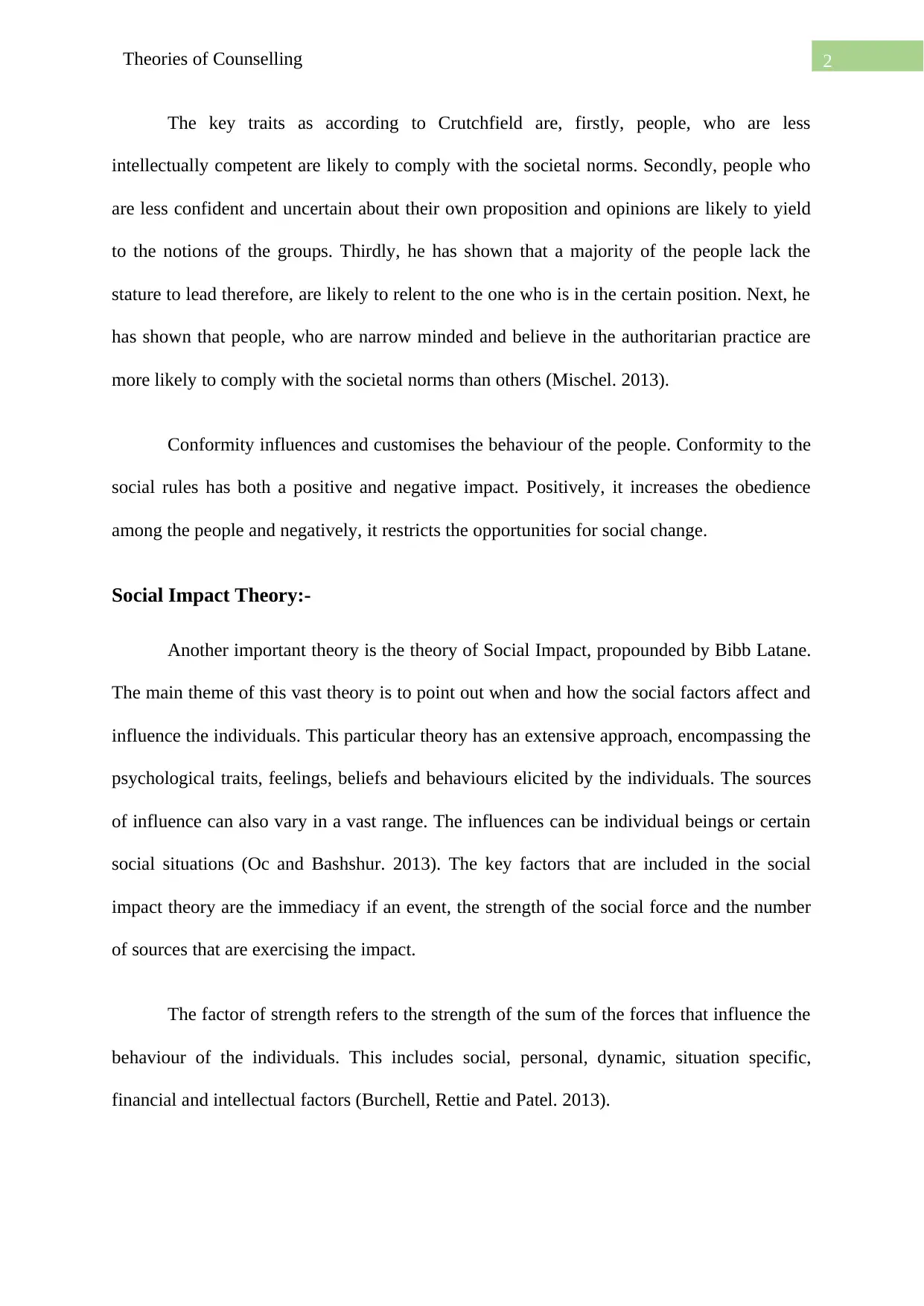
2Theories of Counselling
The key traits as according to Crutchfield are, firstly, people, who are less
intellectually competent are likely to comply with the societal norms. Secondly, people who
are less confident and uncertain about their own proposition and opinions are likely to yield
to the notions of the groups. Thirdly, he has shown that a majority of the people lack the
stature to lead therefore, are likely to relent to the one who is in the certain position. Next, he
has shown that people, who are narrow minded and believe in the authoritarian practice are
more likely to comply with the societal norms than others (Mischel. 2013).
Conformity influences and customises the behaviour of the people. Conformity to the
social rules has both a positive and negative impact. Positively, it increases the obedience
among the people and negatively, it restricts the opportunities for social change.
Social Impact Theory:-
Another important theory is the theory of Social Impact, propounded by Bibb Latane.
The main theme of this vast theory is to point out when and how the social factors affect and
influence the individuals. This particular theory has an extensive approach, encompassing the
psychological traits, feelings, beliefs and behaviours elicited by the individuals. The sources
of influence can also vary in a vast range. The influences can be individual beings or certain
social situations (Oc and Bashshur. 2013). The key factors that are included in the social
impact theory are the immediacy if an event, the strength of the social force and the number
of sources that are exercising the impact.
The factor of strength refers to the strength of the sum of the forces that influence the
behaviour of the individuals. This includes social, personal, dynamic, situation specific,
financial and intellectual factors (Burchell, Rettie and Patel. 2013).
The key traits as according to Crutchfield are, firstly, people, who are less
intellectually competent are likely to comply with the societal norms. Secondly, people who
are less confident and uncertain about their own proposition and opinions are likely to yield
to the notions of the groups. Thirdly, he has shown that a majority of the people lack the
stature to lead therefore, are likely to relent to the one who is in the certain position. Next, he
has shown that people, who are narrow minded and believe in the authoritarian practice are
more likely to comply with the societal norms than others (Mischel. 2013).
Conformity influences and customises the behaviour of the people. Conformity to the
social rules has both a positive and negative impact. Positively, it increases the obedience
among the people and negatively, it restricts the opportunities for social change.
Social Impact Theory:-
Another important theory is the theory of Social Impact, propounded by Bibb Latane.
The main theme of this vast theory is to point out when and how the social factors affect and
influence the individuals. This particular theory has an extensive approach, encompassing the
psychological traits, feelings, beliefs and behaviours elicited by the individuals. The sources
of influence can also vary in a vast range. The influences can be individual beings or certain
social situations (Oc and Bashshur. 2013). The key factors that are included in the social
impact theory are the immediacy if an event, the strength of the social force and the number
of sources that are exercising the impact.
The factor of strength refers to the strength of the sum of the forces that influence the
behaviour of the individuals. This includes social, personal, dynamic, situation specific,
financial and intellectual factors (Burchell, Rettie and Patel. 2013).
⊘ This is a preview!⊘
Do you want full access?
Subscribe today to unlock all pages.

Trusted by 1+ million students worldwide
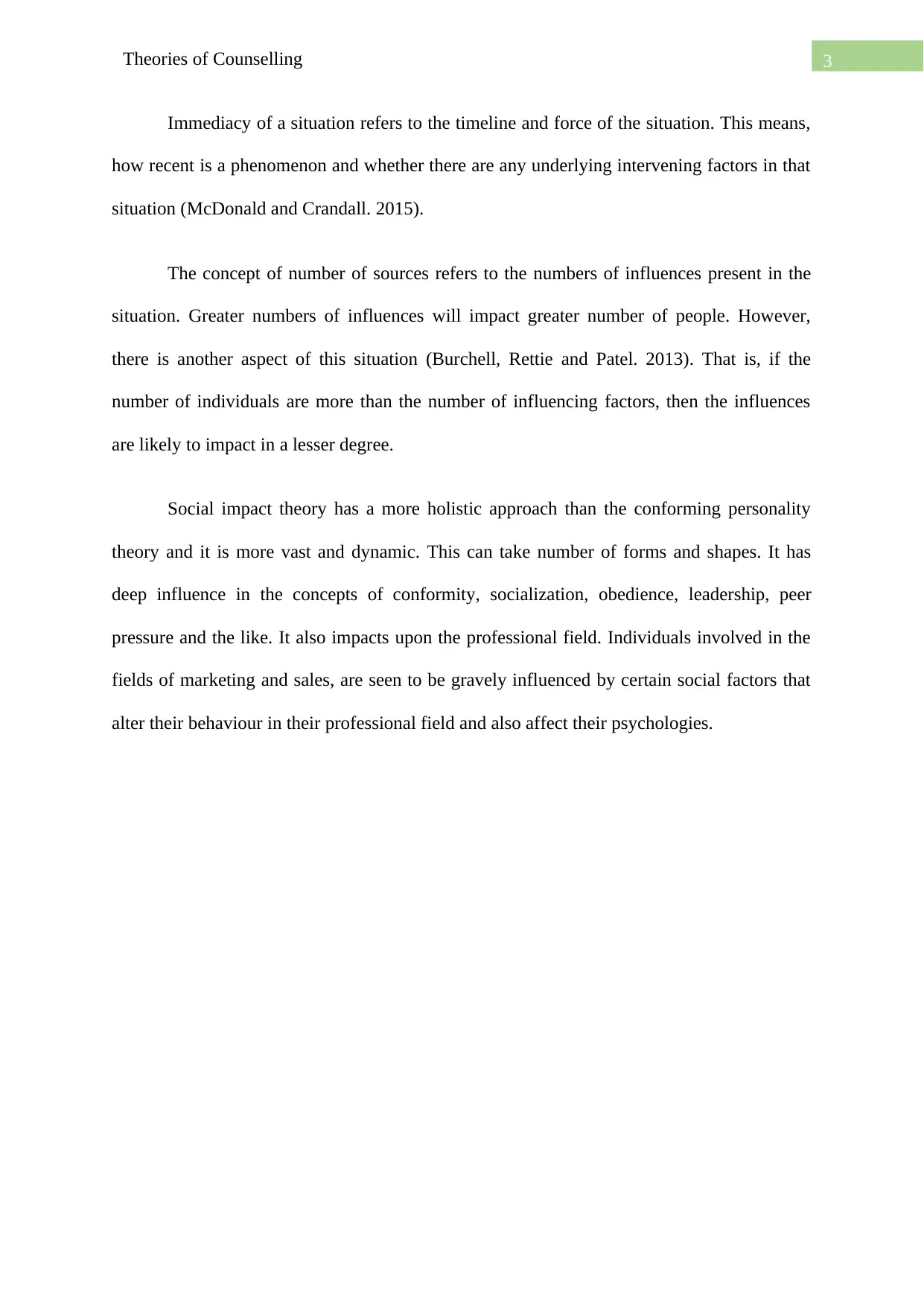
3Theories of Counselling
Immediacy of a situation refers to the timeline and force of the situation. This means,
how recent is a phenomenon and whether there are any underlying intervening factors in that
situation (McDonald and Crandall. 2015).
The concept of number of sources refers to the numbers of influences present in the
situation. Greater numbers of influences will impact greater number of people. However,
there is another aspect of this situation (Burchell, Rettie and Patel. 2013). That is, if the
number of individuals are more than the number of influencing factors, then the influences
are likely to impact in a lesser degree.
Social impact theory has a more holistic approach than the conforming personality
theory and it is more vast and dynamic. This can take number of forms and shapes. It has
deep influence in the concepts of conformity, socialization, obedience, leadership, peer
pressure and the like. It also impacts upon the professional field. Individuals involved in the
fields of marketing and sales, are seen to be gravely influenced by certain social factors that
alter their behaviour in their professional field and also affect their psychologies.
Immediacy of a situation refers to the timeline and force of the situation. This means,
how recent is a phenomenon and whether there are any underlying intervening factors in that
situation (McDonald and Crandall. 2015).
The concept of number of sources refers to the numbers of influences present in the
situation. Greater numbers of influences will impact greater number of people. However,
there is another aspect of this situation (Burchell, Rettie and Patel. 2013). That is, if the
number of individuals are more than the number of influencing factors, then the influences
are likely to impact in a lesser degree.
Social impact theory has a more holistic approach than the conforming personality
theory and it is more vast and dynamic. This can take number of forms and shapes. It has
deep influence in the concepts of conformity, socialization, obedience, leadership, peer
pressure and the like. It also impacts upon the professional field. Individuals involved in the
fields of marketing and sales, are seen to be gravely influenced by certain social factors that
alter their behaviour in their professional field and also affect their psychologies.
Paraphrase This Document
Need a fresh take? Get an instant paraphrase of this document with our AI Paraphraser
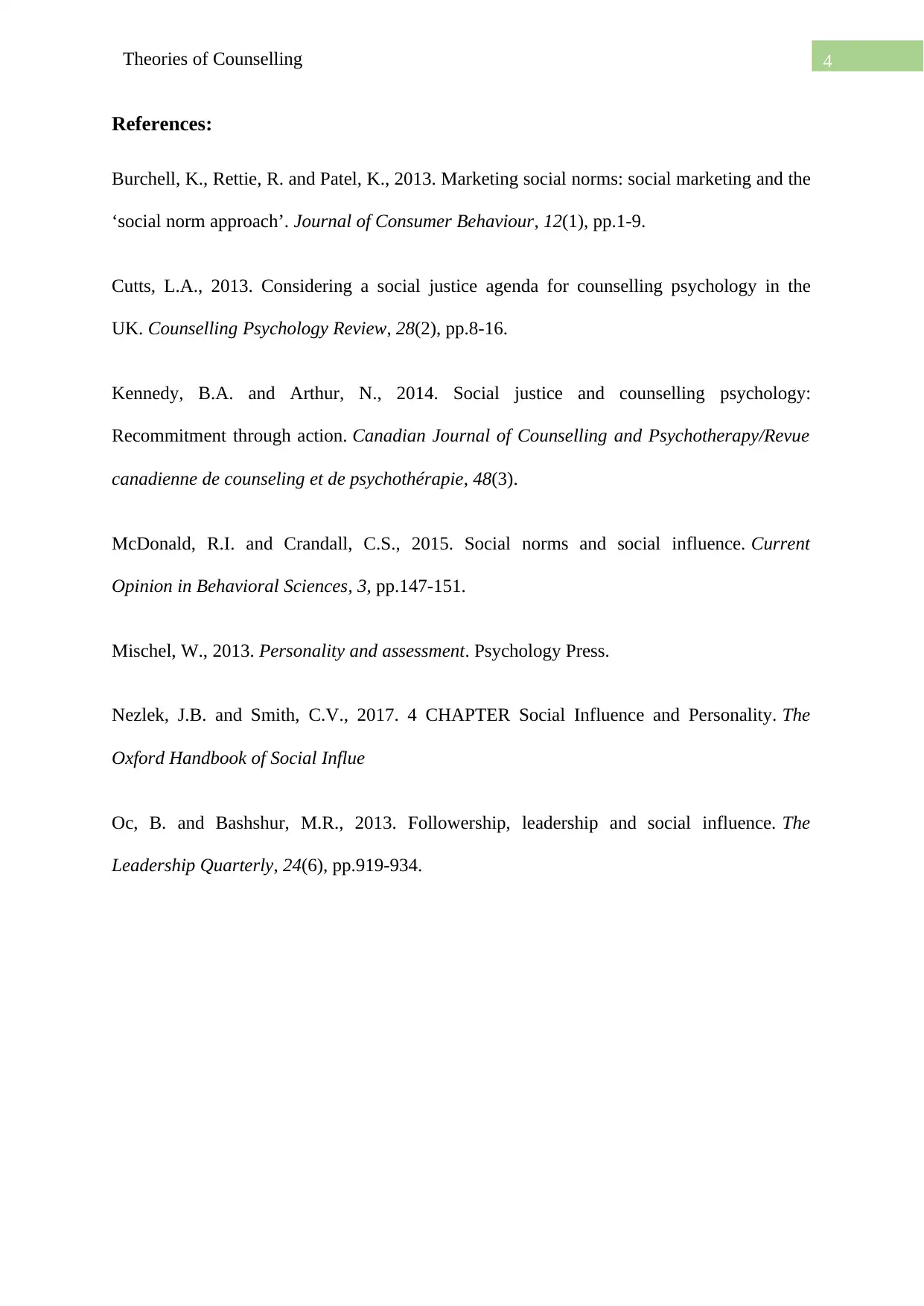
4Theories of Counselling
References:
Burchell, K., Rettie, R. and Patel, K., 2013. Marketing social norms: social marketing and the
‘social norm approach’. Journal of Consumer Behaviour, 12(1), pp.1-9.
Cutts, L.A., 2013. Considering a social justice agenda for counselling psychology in the
UK. Counselling Psychology Review, 28(2), pp.8-16.
Kennedy, B.A. and Arthur, N., 2014. Social justice and counselling psychology:
Recommitment through action. Canadian Journal of Counselling and Psychotherapy/Revue
canadienne de counseling et de psychothérapie, 48(3).
McDonald, R.I. and Crandall, C.S., 2015. Social norms and social influence. Current
Opinion in Behavioral Sciences, 3, pp.147-151.
Mischel, W., 2013. Personality and assessment. Psychology Press.
Nezlek, J.B. and Smith, C.V., 2017. 4 CHAPTER Social Influence and Personality. The
Oxford Handbook of Social Influe
Oc, B. and Bashshur, M.R., 2013. Followership, leadership and social influence. The
Leadership Quarterly, 24(6), pp.919-934.
References:
Burchell, K., Rettie, R. and Patel, K., 2013. Marketing social norms: social marketing and the
‘social norm approach’. Journal of Consumer Behaviour, 12(1), pp.1-9.
Cutts, L.A., 2013. Considering a social justice agenda for counselling psychology in the
UK. Counselling Psychology Review, 28(2), pp.8-16.
Kennedy, B.A. and Arthur, N., 2014. Social justice and counselling psychology:
Recommitment through action. Canadian Journal of Counselling and Psychotherapy/Revue
canadienne de counseling et de psychothérapie, 48(3).
McDonald, R.I. and Crandall, C.S., 2015. Social norms and social influence. Current
Opinion in Behavioral Sciences, 3, pp.147-151.
Mischel, W., 2013. Personality and assessment. Psychology Press.
Nezlek, J.B. and Smith, C.V., 2017. 4 CHAPTER Social Influence and Personality. The
Oxford Handbook of Social Influe
Oc, B. and Bashshur, M.R., 2013. Followership, leadership and social influence. The
Leadership Quarterly, 24(6), pp.919-934.
1 out of 5
Related Documents
Your All-in-One AI-Powered Toolkit for Academic Success.
+13062052269
info@desklib.com
Available 24*7 on WhatsApp / Email
![[object Object]](/_next/static/media/star-bottom.7253800d.svg)
Unlock your academic potential
Copyright © 2020–2026 A2Z Services. All Rights Reserved. Developed and managed by ZUCOL.





